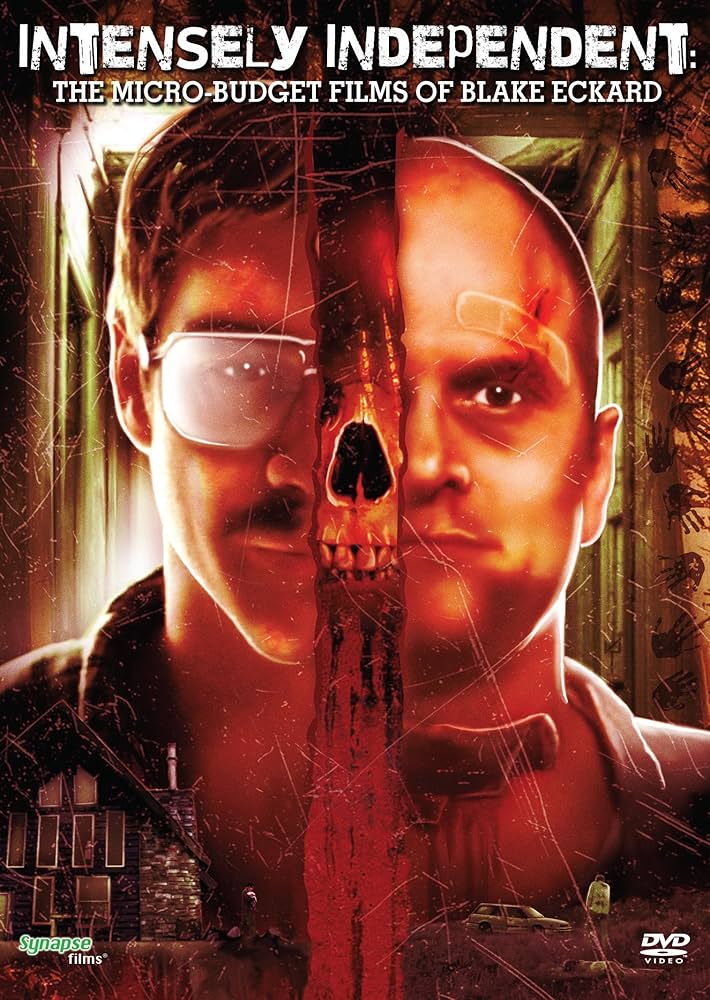In Bubba Moon Face, we follow Horton Bucks (Tyler Messner) who returns to his hometown in northwest Missouri after his mother’s death. He’s broke with no car and resorts to crashing on his brother Stanton (Joe Hammerstone)’s couch. While dealing with their mother’s funeral, Stanton’s fuck buddy Sabetha (Sylvian Geiger) shows up with a baby claiming it’s his. To add even more volatility to this seedy gothic cocktail, Horton’s and Stanton’s meth-head father Gus (Joe Hanrahan) shows up with his way-too-young-for-him girlfriend and also demands to live with them. Plus Horton rekindles a relationship with a with a prostitute named Leslie (Jennifer George) who Horton had a thing for back when she was very underage. Will anyone be able to claw their way out of this hellish cesspool?
In Coyotes Kill for Fun, Bev (Arianne Martin) is a small-town mechanic with two kids living with an unstable asshole named Larry (Todd Morten). She wants to escape her dead end life and seduces her co-worker Cliff (Tyler Messner) into helping her get rid of her abusive boyfriend. Also involved in the scheme is the kids’ babysitter Sue Anne (Roxanne Rogers) who seems pretty out of it herself. To complicate matters, Larry’s psychotic twin brother Ed enters the picture and threatens to disrupt Bev’s carefully constructed plans.
The films of Blake Eckhard are bleak and lurid. No one is going to have fun with these films but there is an undeniable hayseed skill put into making them. Both Bubba Moon Face and Coyotes Kill for Fun are extremely low budget with very few locations, presumptively shot mostly in northwest Missouri where Eckhard is from. And while the technical limitations are quite apparent at times (both films were shot on what appear to be older DV cameras), Bubba Moon Face in particular has some quite evocative imagery courtesy of Eckhard’s cinematographer Cody Stokes. Both films are also surprisingly well-acted and naturalistic for this type of picture where I’m used to wooden, stilted actors who stumble over their lines. In particular, Joe Hanrahan as Gus in Bubba Moon Face really chews into his role with gusto, playing an unrepentant scum bag to a tee. Both films have thematic elements that place them in the vicinity of David Lynch’s fixation on the corruption of small town America in Blue Velvet but with an even darker, more scuzzy streak to it. Coyotes Kill for Fun adds a seedy noir murder plot to the mix as well. I feel overall that Bubba Moon Face is the stronger of the two films. While the characters are relentlessly unlikable, it has a consistent visual language and a thematic richness to its core theme of lost redemption. Coyotes Kill for Fun is perhaps the more engaging plot-wise but feels very inconsistent in its visual styling, having been shot over three years by a combination of Eckhard, Stokes and legendary indie director Jon Jost (Last Chants for a Slow Dance, Angel City). Having said that, Coyotes Kill for Fun also has moments of a kind of rustic pastoral beauty to it, and certainly has more of a drive narratively. The commonality between these two films is a perennial bleakness that rots from the inside out. Children are a mechanism to place false hope upon. Happiness is a foreign concept to all involved. Evil can and will win at times. That’s just how life goes in the dregs of society.
As to the image quality, it’s no surprise that these films do not look great. I’m sure Synapse has done the best they could with these, but the fact that they were released on DVD is pretty telling. Both were shot on grainy, washout and dated digital video and look like they maybe were made in the ’90s rather than the 2010s as they actually were. As such, adjust expectations as necessary. The stereo audio tracks for both films is similarly somewhat inconsistent primarily due to the source elements. The dialogue at times sounds somewhat muffled or distant, pretty standard hallmarks of low budget filmmaking. For extras we have first an audio commentary on Bubba Moon Face with cinematographer Cody Stokes and actors Joe Hammerstone and Joe Hanrahan. They discuss what it was like to work with Eckhard and how Eckhard approached shooting the film and working with his actors. Overall a solid commentary with some interesting anecdotes and info. Also it was apparently Stokes’ idea to shoot in DV instead of 16mm (a mistake in my opinion). We also get an interview with Jon Jost on how he got involved with shooting some of Coyotes Kill for Fun. The interview also lets him just kind of ramble off on other tangents unrelated to Eckhard. We also get a physical booklet featuring an essay on Eckhard’s career from film critic Andrew Wyatt.
The films of Blake Eckhard are frankly not for everyone. They are full of disgusting, reprehensible and unlikable characters who do terrible things. But also they have a kind of pull to them that demands you sink to their level, so you can see what’s above you more clearly. If you have an appreciation for lo-fi indie cinema that isn’t afraid to pull punches, you may find this duo of films richly rewarding.

